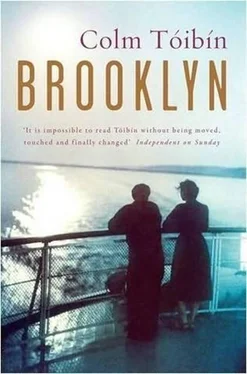Even when she woke in the night and thought about it, she did not allow herself to conclude that she did not want to go. Instead, she went over all the arrangements and worried about carrying two suitcases with all her clothes without any help, and making sure that she did not lose the handbag that Rose had given her, where she would keep her passport, and the addresses in Brooklyn where she would live and work, and Father Flood's address in case he did not turn up to meet her as he had promised to do. And money. And her make-up bag. And an overcoat maybe to be carried over her arm, although perhaps she would wear it, she thought, unless it was too hot. And it still might be hot in late September, she had been warned.
She had already packed one case and hoped, as she went over its contents in her mind, that she would not have to open it again. It struck her on one of those nights, as she lay awake, that the next time she would open that suitcase it would be in a different room in a different country, and then the thought came unbidden into her mind that she would be happier if it were opened by another person who could keep the clothes and shoes and wear them every day. She would prefer to stay at home, sleep in this room, live in this house, do without the clothes and shoes. The arrangements being made, all the bustle and talk, would be better if they were for someone else, she thought, someone like her, someone the same age and size, who maybe even looked the same as she did, as long as she, the person who was thinking now, could wake in this bed every morning and move as the day went on in these familiar streets and come home to the kitchen, to her mother and Rose.
Even though she let these thoughts run as fast as they would, she still stopped when her mind moved towards real fear or dread or, worse, towards the thought that she was going to lose this world for ever, that she would never have an ordinary day again in this ordinary place, that the rest of her life would be a struggle with the unfamiliar. Downstairs, once Rose and her mother were there, she talked about practical things and remained bright.
One evening, when Rose invited her into her room so that she could choose some pieces of jewellery to bring with her, something new occurred to Eilis that surprised her by its force and clarity. Rose was thirty now, and since it was obvious that their mother could never be left to live alone, not merely because her pension was small but because she would be too lonely without any of them, Eilis's going, which Rose had organized so precisely, would mean that Rose would not be able to marry. She would have to stay with her mother, living as she was now, working in Davis's office, playing golf at the weekends and on summer evenings. Rose, she realized, in making it easy for her to go, was giving up any real prospect of leaving this house herself and having her own house, with her own family. Eilis, as she fitted on some necklaces, seated in front of her dressing-table mirror, saw that in the future, as her mother got older and more frail, Rose would have to care for her even more, go up the steep steps of the stairs with trays of food and do the cleaning and cooking when her mother could not.
It occurred to her also, as she tried on some earrings, that Rose knew all this too, knew that either she or Eilis would have to leave, and had decided to let Eilis go. As she turned and looked at her sister, Eilis wanted to suggest that they change places, that Rose, so ready for life, always making new friends, would be happier going to America, just as Eilis would be quite content to stay at home. But Rose had a job in the town and she did not, and so it was easy for Rose to sacrifice herself, since it seemed that she was doing something else. In these moments, as Rose offered her some brooches to take with her, Eilis would have given anything to be able to say plainly that she did not want to go, that Rose could go instead, that she would happily stay here and take care of her mother and they would manage somehow and maybe she would find other work.
She wondered if her mother too believed that the wrong sister was leaving, and understood what Rose's motives were. She imagined that her mother knew everything. They knew so much, each one of them, she thought, that they could do everything except say out loud what it was they were thinking. She resolved as she went back to her room that she would do everything she could for them by pretending at all times that she was filled with excitement at the great adventure on which she was ready to embark. She would make them believe, if she could, that she was looking forward to America and leaving home for the first time. She promised herself that not for one moment would she give them the smallest hint of how she felt, and she would keep it from herself if she had to until she was away from them.
There was, she thought, enough sadness in the house, maybe even more than she realized. She would try as best she could not to add to it. Her mother and Rose could not be fooled, she was sure, but there seemed to her an even greater reason why there should be no tears before her departure. They would not be needed. What she would need to do in the days before she left and on the morning of her departure was smile, so that they would remember her smiling.
Rose took the day off from work and travelled with her to Dublin. They went to lunch together in the Gresham Hotel before it was time for the taxi to the boat to Liverpool, where Jack had agreed to meet her and spend the day with her before she set out on her long journey to New York. That day in Dublin Eilis was aware that going to work in America was different from just taking the boat to England; America might be further away and so utterly foreign in its systems and its manners, yet it had an almost compensating glamour attached to it. Even going to work in a shop in Brooklyn with lodgings a few streets away, all organized by a priest, had an element of romance that she and Rose were fully alert to as they ordered their lunch in the Gresham, having left her luggage in the railway station. Going to work in a shop in Birmingham or Liverpool or Coventry or even London was sheer dullness compared to this.
Rose had dressed up beautifully for the day, and Eilis had tried to look as well as she could. Rose, merely by smiling at the hotel porter, seemed to be able to make him stand in O'Connell Street to get a taxi for them, insisting that they wait in the lobby. So too as many passengers made their way towards the boat Rose seemed in command. No one who did not have a ticket was allowed beyond a certain point; Rose, however, made an exception of herself with the assistance of the ticket collector, who fetched a colleague to help the ladies with their suitcases. He told Rose she could stay on the boat until half an hour before it was due to sail, when he would locate her, accompany her back and then find someone to keep an eye on her sister for the crossing to Liverpool. Even people with first-class tickets would not get this treatment, Eilis remarked to Rose, who smiled knowingly and agreed.
"Some people are nice," she said, "and if you talk to them properly, they can be even nicer."
They both laughed.
"That'll be my motto in America," Eilis said.
In the early morning when the boat arrived in Liverpool she was helped with her luggage by a porter who was Irish. When she told him she was not sailing to America until later that day, he advised her to take her cases immediately down to a shed where a friend of his worked, close to where the transatlantic liners docked; if she gave the man at the office his name, then she would be free of them for the day. She found herself thanking him in a tone that Rose might have used, a tone warm and private but also slightly distant though not shy either, a tone used by a woman in full possession of herself. It was something she could not have done in the town or in a place where any of her family or friends might have seen her.
Читать дальше












